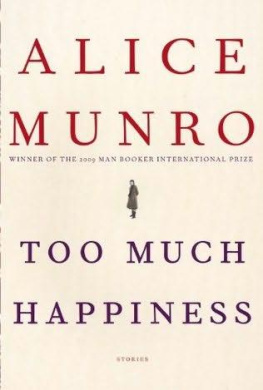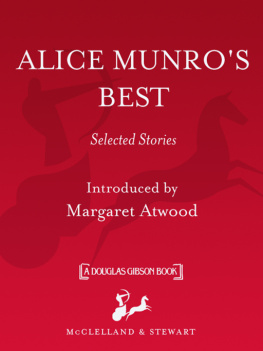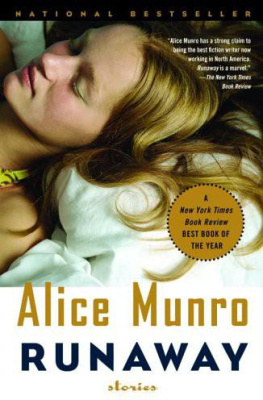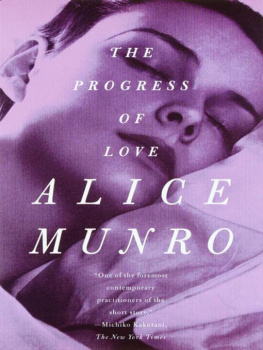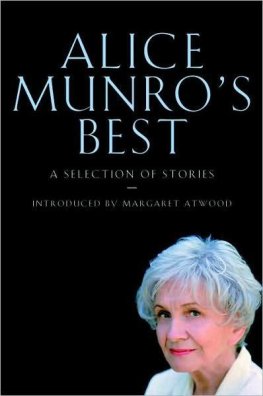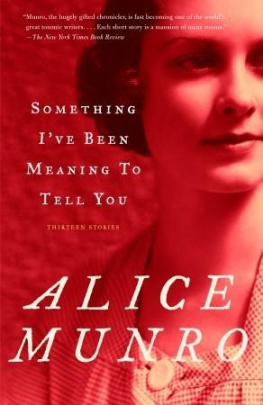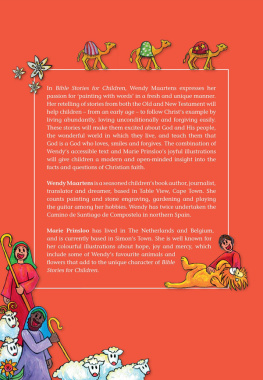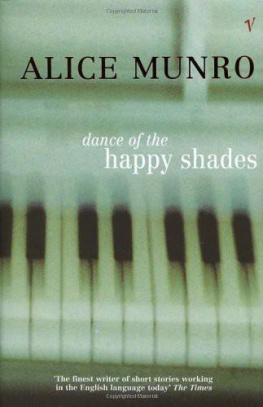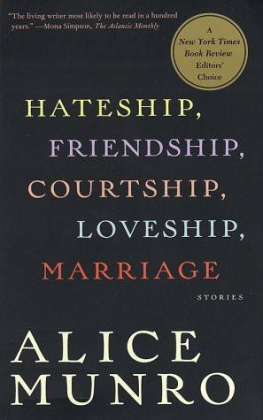Face
I am convinced that my father looked at me, stared at me, saw me, only once. After that, he could take for granted what was there.
In those days they didnt let fathers into the glare of the theater where babies were born, or into the room where the women about to give birth were stifling their cries or suffering aloud. Fathers laid eyes on the mothers only after they were cleaned up and conscious and tucked up under pastel blankets in the ward, or in the semi-private or private rooms. My mother had a private room, as became her status in the town, and just as well, actually, seeing the way things turned out.
I dont know whether it was before or after his first look at my mother that my father stood outside the window of the nursery for his first glimpse of me. I rather think it was after, and that when she heard his steps outside her door and crossing her room, she heard the anger in them but did not know yet what had caused it. After all, she had borne him a son, which was presumably what all men wanted.
I know what he said. Or what she told me he said.
What a chunk of chopped liver.
Then, You dont need to think youre going to bring that into the house.
One side of my face wasisnormal. And my entire body was normal from toes to shoulders. Twenty-one inches was my length, eight pounds five ounces my weight. A strapping male infant, fair skinned though probably still red from my unremarkable recent journey.
My birthmark not red, but purple. Dark in my infancy and early childhood, fading somewhat as I got older, but never fading to a state of inconsequence, never ceasing to be the first thing you notice about me, head-on, or are shocked to see if you have come at me from the left, or clean, side. It looks as if someone has dumped grape juice or paint on me, a big serious splash that does not turn to driblets till it reaches my neck. Though it does skirt my nose pretty well, after dousing one eyelid.
It makes the white of that eye look so lovely and clear was one of the idiotic though pardonable things my mother would say, in the hope of making me admire myself. And an odd thing happened. Sheltered as I was, I almost believed her.
Of course my father could not do anything to prevent my coming home. And of course my presence, my existence, made a monstrous rift between my father and mother. Though it is hard for me to believe there had not always been some rift, some incomprehension at least, or chilly disappointment.
My father was the son of an uneducated man who owned a tannery and then a glove factory. Prosperity was ebbing as the twentieth century progressed, but the big house was still there, the cook and the gardener. My father went to college, joined a fraternity, had what was referred to as a high old time, entered the insurance business when the glove factory went under. He was as popular around our town as he had been at college. A good golfer, an excellent sailor. (I have not mentioned that we lived on the cliffs above Lake Huron, in the Victorian house my grandfather had built facing the sunset.)
At home my fathers most vivid quality was a capacity for hating and despising. In fact those two verbs often went together. He hated and despised certain foods, makes of automobile, music, manners of speech and modes of dress, radio comedians and later on television personalities, as well as the usual assortment of races and classes it was customary to hate and despise (though perhaps not so thoroughly as he did) in his day. In fact most of his opinions would have found no argument outside our house, in our town, with his sailing companions, or his old fraternity brothers. It was his vehemence, I think, that brought out an uneasiness that could also amount to admiration.
Calls a spade a spade. That was what was said of him.
Of course a production like myself was an insult he had to face every time he opened his own door. He took breakfast alone and did not come home for lunch. My mother ate those meals with me and part of her dinner also, the rest of dinner with him. Then I think there was some sort of row about this, and she sat through my meal with me but ate with him.
It can be seen that I could not contribute to a comfortable marriage.
But how had they ever come together? She had not gone to college, she had to borrow money to attend a school where teachers were trained in her day. She was frightened of sailing, clumsy at golf, and if she was beautiful, as some people have told me (it is hard to make that judgment of your own mother), her looks cannot have been of the kind my father admired. He spoke of certain women as stunners, or, later in his life, as dolls. My mother did not wear lipstick, her brassieres were unassertive, her hair was done in a tight crown of braids that emphasized her wide white forehead. Her clothes lagged behind the style, being somewhat shapeless and regalshe was the sort of woman you could imagine wearing a rope of fine pearls, though I dont think she ever did.
What I seem to be saying, I guess, is that I may have been a pretext, a blessing even, in that I furnished them with a ready-made quarrel, an insoluble problem which threw them back on their natural differences where they may in fact have been more comfortable. In all my years in the town, I encountered no one who was divorced, and so it may be taken for granted that there were other couples living separate lives in one house, other men and women who had accepted the fact that there were differences never to be mended, a word or an act never to be forgiven, a barrier never to be washed away.
It follows, unsurprisingly in such a story, that my father smoked and drank too muchthough most of his friends did too, whatever their situations. He had a stroke while still in his fifties, and died after several months in bed. And it was not a surprise that my mother nursed him all that time, kept him at home, where instead of becoming tender and appreciative he called her quite foul names, thickened by his misfortune but always decipherable to her, and to him, it seemed, quite gratifying.
At the funeral a woman said to me, Your mother is a saint. I remember this womans appearance quite well, though not her name. White curls, rouged cheeks, dainty features. A tearful whisper. I disliked her instantly. I scowled. I was at that time in my second year at college. I had not joined, or been invited to join, my fathers fraternity. I hung around with people who were planning to be writers and actors and were at present wits, dedicated time wasters, savage social critics, newborn atheists. I had no respect for people who behaved like saints. And to be truthful, that was not what my mother aimed for. She was far enough from pious notions that she had never asked me, on any of my trips home, to go into my fathers room, to try for a word of reconciliation with him. And I had never gone. There was no notion of a reconciliation, or any blessing. My mother was no fool.
She had been devoted to menot the word either of us would have used, but I think the right onetill I was nine years old. She taught me herself. Then she sent me away to school. This sounds like a recipe for disaster. The mother-coddled purple-faced lad, thrown suddenly amongst the taunts, the ruthless assaults of young savages. But I didnt have a bad time, and to this day Im not sure why not. I was tall and strong for my age, and that might have helped. I think, though, that the atmosphere in our house, that climate of ill temper and ferocity and disgusteven coming from an often unseen fathermay have made any other place seem reasonable, almost accepting, though in a negative not a positive way. It was not a question of anybody making an effort, being nice to me. There was a name for meit was Grape-Nuts. But almost everybody had a derogatory nickname. A boy with particularly smelly feet that did not seem to benefit from daily showers cheerfully put up with the name of Stink. I got along. I wrote my mother comical letters, and she replied somewhat in kind, taking a mildly satirical tone about events in town and in churchI remember her describing a row about the right way to cut sandwiches for a ladies teaand even managing to be humorous but not bitter about my father, whom she referred to as His Grace.

